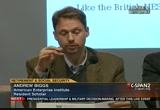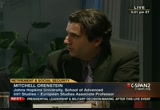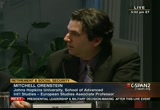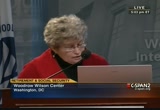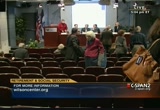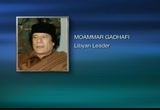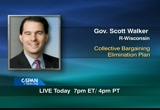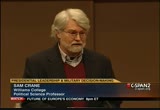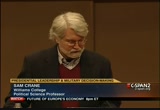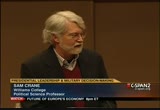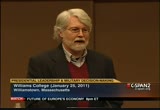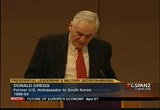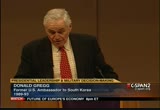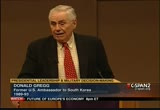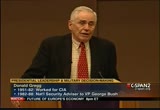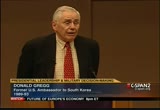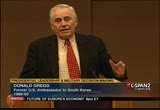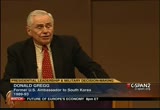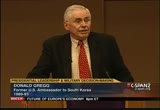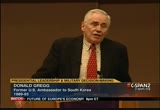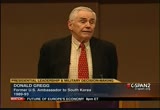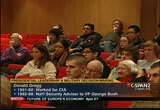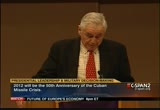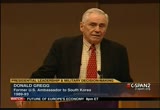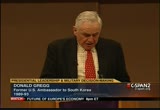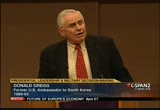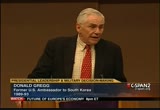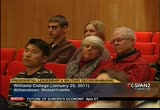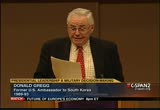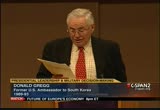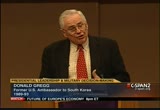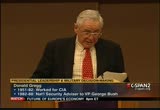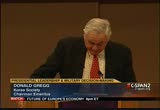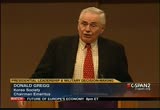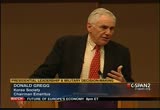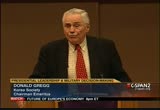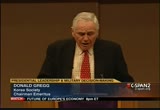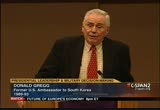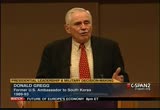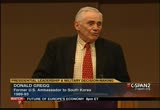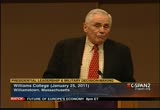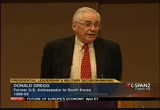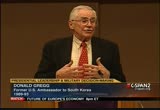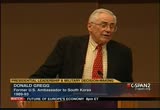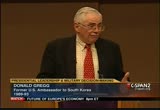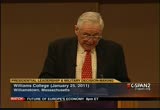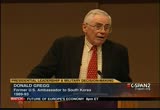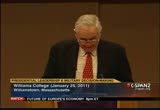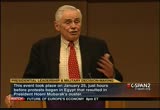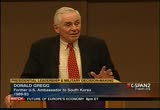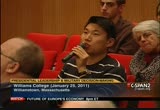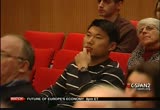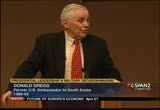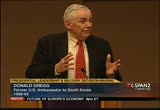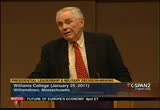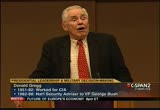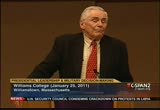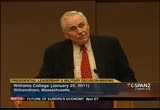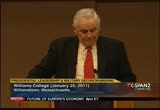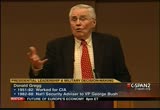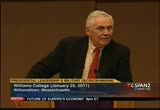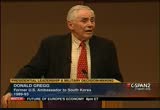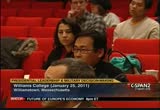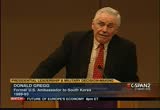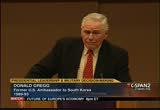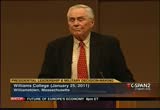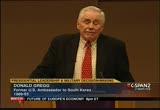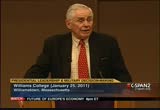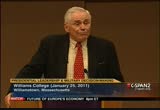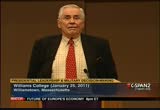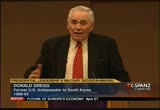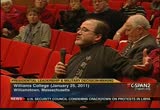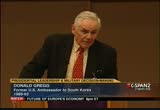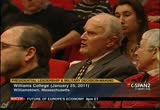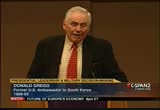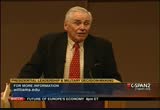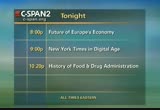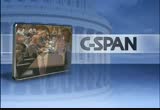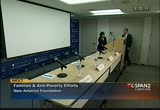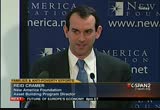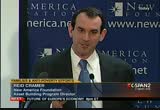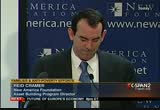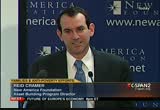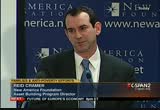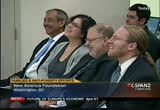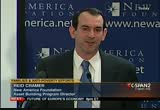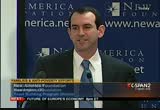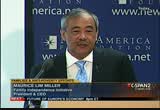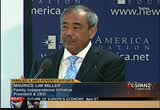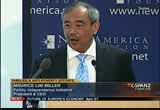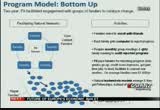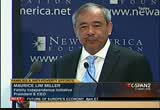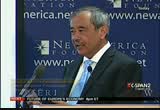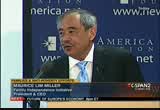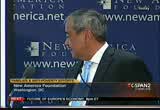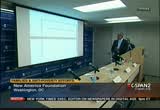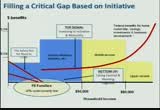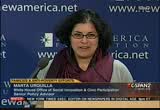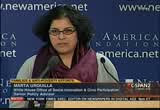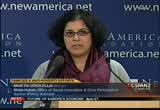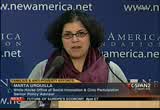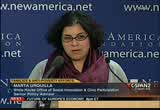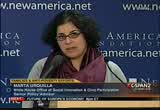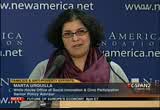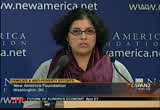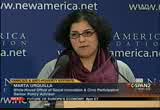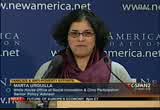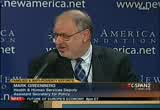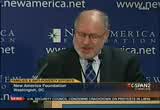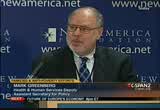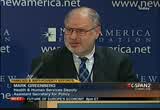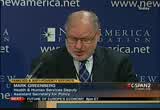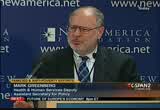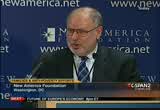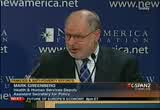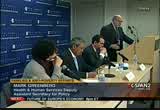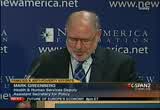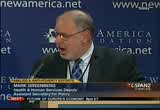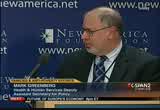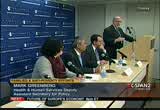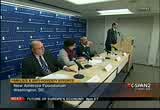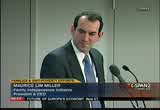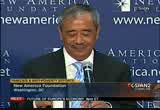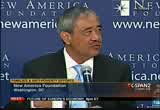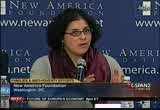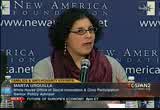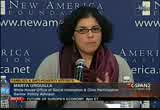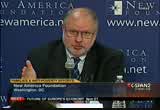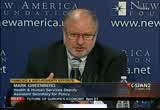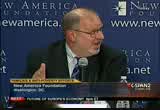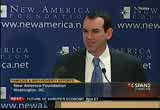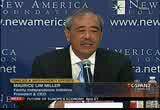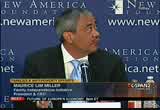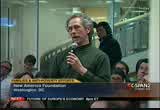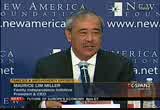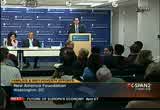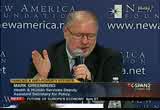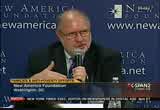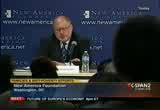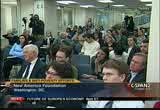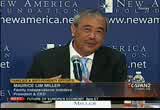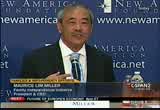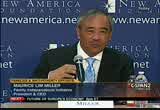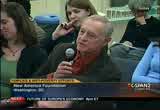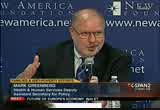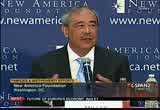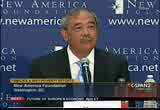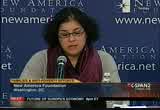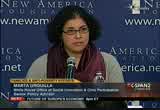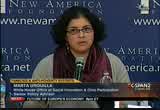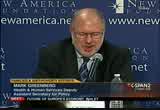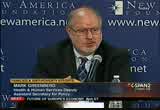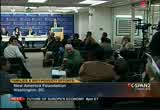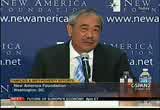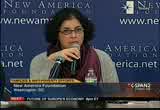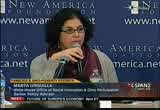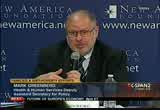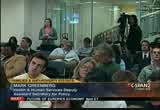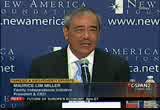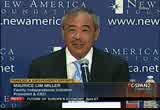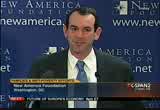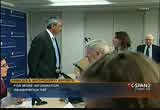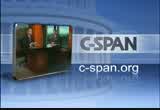tv U.S. Senate CSPAN February 22, 2011 5:00pm-7:59pm EST
5:00 pm
rate under the administration's proposal is around 53% if you're in a high-tax state, you pay more than half of that to either government in washington or at the state level. if you eliminate the tax cap for social security, you're adding on 10 percentage points to that, so our top tax rate goes around 63% of an additional dollar somebody earns they pay to the government. now, i personally just philosophically think that's too high, i think from an economic perspective it's too high, and i think it's particularly too high when you say all of this assumes we haven't done a penny to fix medicare or medicaid which are, in fact, much bigger problems. if you have your top tax rate at 63% without fixing care or medicaid, you're in the big, big trouble. >> we're going to have to close, but i just warrant to ask the panelists -- want to ask the panelists if they have any different thoughts and what insights might we draw from
5:01 pm
5:02 pm
across the board in the government deficit of 20%-25%. they decided not to cut social security in britain, and up stead have initiated a system of private individual saving accounts that will be added on on top of social security and financed by an extra employer contribution and an extra employee contribution of 3% each. i think that is really telling for where we are in the u.s. to date, that we don't -- just because of cutting the budget deficit, we don't need to cut social security which is a low level of adequacy already, and to encourage more savings and then think about, in fact, adding to people's tax burden to fund the types of legitimate
5:03 pm
retirement income they expect in the future. >> well, one thing to be sure about is longevity. we have plenty of time to debate the issues. [laughter] hopefully we can talk about medicaid and medicare in the future. it is one to be talked about. i hope we can bring the panelists back to do that. please join me in thanking everybody very much. [applause] also, please note that copies, i think just the one book on social security are available for sale outside, and i'm sure he'd be happy to sign them. >> sure. >> thank you, panelists. [inaudible conversations] [inaudible conversations] [inaudible conversations]
5:04 pm
5:05 pm
ing in [inaudible conversations] [inaudible conversations] [inaudible conversations] [inaudible conversations] [inaudible conversations] [inaudible conversations] [inaudible conversations] [inaudible conversations] [inaudible conversations] >> right now on c-span, a live debate from dublin where leaders of the three major irish political parties face off in their final tv debate.
5:06 pm
voters head to the polls on friday to elect their representatives in the irish parliament. outgoing prime minister recently resigned as leader of the cena foil party. they are doing poorly in the polls due to the economic problems. they recently received an economic pack acknowledge from the european union. it's live right now over on c-span. the violence on the streets of libya's capitol continues. the leader gadhafi is urging to take to the streets. men last night went on a rampage shooting on site anyone on the streets and firing at people watching from windows of their homes. last night, he vowed to fight to the last drop of blood and die a
5:07 pm
martyr. >> this evening governor scott walker holds a fire side chat to talk about the state's budget and ongoing protests. republicans were elected to lead the state assembly last november and pledged to cut state spending. he'll address benefits as well as ongoing budget issues. live later today at 7 p.m. eastern on c-span.
5:08 pm
>> last month, former u.s. ambassador to south korea and cia agent, donald greg, spoke to students about military issues. based on his experience with president kennedy during the cuban missile crisis in 1962. he talked about the situations in iran, afghanistan, and the political unrest in the middle east. held at william's college in massachusetts, this is an hour and 10 minutes.
5:09 pm
>> good evening. i'm sam crane, the fred green's third century professor of science here at williams and served as the chair of the international studies program, and i have the pleasure and privilege to introduce our guest, donald craig. first, let me recognize the organizations that arranged tonight's talk. the stanley kaplan prom in american foreign policy, the leadership studies program, and the international studies program all pr here at williams college. ambassador donald is a member of the class of 19 # 51 -- 1951 of williams college as a philosophy major. when he graduated, he joined the central intelligence agency, the
5:10 pm
cia, and started a career there that lasted for 32 years. he held a variety of different posts in different countries including burma, japan, south vietnam, and south korea. in 1979, he served on the national security counsel staff for the president, and in 1982, he served as the national security adviser for then vice president george hw bush. in 1989, he was appointed as ambassador to south korea where he served until 1993 after which he left government service and took on the position of chairman of the korea society, and he currently holds the position of chairman amaretis of the society. don't is a great friend and son of the williams college. he's been here many times giving
5:11 pm
lectures and classes. i've met him on several occasions, but there two things i learned just recently about him, one of which shows us the true breath of his accomplishments in foreign policy and international relations. it turns out that in a 1995 book by tom clancy called "opt center" there is a character and nevertheless that name of the character is gregory donald and it's believed to be based losely on our own donald greg. i learned his middle name is finny. for those of you who are historians, you know one the great presidents here was james finny baxter.
5:12 pm
it is true, there's a long term ancient connection between the families. that shows the depth of his association with williams college. tonight, ambassador greg will speak to the topics of advice to president obama in 201, look to the cuban missile crisis to what it tells you about presidential leadership in a military crisis. it's an apt topic given this evening president obama is providing or giving his state of the union address which we will broadcast in this room immediately following ambassador greg's remarks tonight, so if you'd like to stay for that, you can. we'll see if president obama takes the advice that the ambassador is willing to offer. he'll speak for about 45 minutes to which after he'll take
5:13 pm
questions. we'll have microphones to pass around for people to use for question time. pleas join -- please join me in warmly welcoming ambassador donald greg. [applause] >> thank you. [applause] thank you. [applause] well, for somebody from the third century, he looks very good. [laughter] you completely blew my cover, and i have to say a little bit more about my career as gregory donald in tom clancey's book. in my first visit to north korea in 2002, i was asked three questions by the north koreans. the first was why is george w. bush so different from his father? a good question. second, how do you function as a country when you elect people who have nothing in common with
5:14 pm
their predecessor? whenever you have a presidential relations, your relations with us are turned inside out. a straight comment, and then, why don't you understand us better? i was paying them a complement, and i said you're what i call the longest running failure in the history of american espionage, and i can say that because i was a part of that failure. i chased you around for a number of decades. at that point they said are you wearing your opt center hat? i said, my, gosh, you can't be talking about that book. they said, of course, we are. i said, well, i haven't read it, but my wife has. would you like her reaction to it? they said, yes, we would be interested. i said, well, it's referred to as an airport only pocketbook, and i said she really didn't
5:15 pm
mind the fact that i died a heroic death at the end of the book, but she was furious that i had a korean mistress. [laughter] the north koreans got a big kick out of that. well, back to what i had sort of intended to say originally. when i was asked to come up here and give this talk, i was delighted to accept and had no idea that the president would be speaking on the same evening, so this is -- he's not asked me to come to do this on the same night, it's just a coincidence, but i think it's a happy coincidence, and i am very glad to be able to talk about the issue of presidential leadership as it emerges in terms of dealing with military crisis, and i'm very happy to be able to speak about president obama and president kennedy.
5:16 pm
this is an interesting year. this is the midpoint of president obama's first term and perhaps his only term. 50 years ago last week, john f. kennedy was sworn into office. president kennedy was the first catholic to become president. he was the youngest president ever elected at the age of 43. he beat richard nixon by a raiser thin margin of 120,000 votes, and he raised a lot of doubts in the american voting public. he was young, inexperienced, he was a catholic, very eloquent, turned everybody on by his inauguration speech, not asking what your government can do for you, but what you can do for your government, saying things like never negotiate from fear, but never fear to negotiate,
5:17 pm
something which president obama has spoken of with admiration. president obama is the first black president. he was not particularly experienced when he was elected. he has raised a lot of angst on people's part because he he is the first african-american president. he's made real gains in his first term, but he's also fallen short in some areas, and as this is any 60th year as a williams graduate, and as these two presidents have made probably the deepest impression on me of any president that has served in this 60 year period, i am delighted to try to draw a few comparisons between them. i've never met president obama, but i did meet president kennedy in 1963 when i was part of the
5:18 pm
first group trained in what was called counterinsurgency in those days. he was a tremendously impressive person to meet, the 30 or so of us trained stood in line to shake hands with him. we listened to what people said ahead of us. i was behind stillwell's son, and kennedy gave him his undivided attention for 20 seconds or so. same thing happened to me, and i left with a vivid impression with the feel of his handshake, the strength of his glance, the intensity of his person -- personality. in his presidency, he got off to a few bad mistakes early on. he inherited from president eisenhower the plans for the invasion of cuba in the bay of
5:19 pm
pigs. cuba was the third in a list of eight countries that the brothers had designated as countries where leadership had to be overthrown. i think this was a part of our history where a sense of exceptionalism was particularly strong and the dallas brothers man fasted that very -- manifested that very strongly. the first target of their disapproval was iran, and the overthrow and the reestablishment of the shaw was regarded as a great success in cia's early days. second was guatemala where we installed a bloody-minded general over someone who appeared to be a little too leftist for our liking, and cuba was third. the planning had not gone well
5:20 pm
at the end of the eisenhower regime, so kennedy inherited that bad planning, and he went ahead with it based on some very, i think, unfair and unbalanced briefings by alan dallas and the invasion was a disaster. it enraged castro and turned him solidly against president kennedy. his next mistake occurred in june of his first year where when he insisted ongoing to vienna and meeting with kruschev. he was advised against this, but insisted on doing it, and the meeting went very badly. kennedy was ease constitute enough to realize he had not
5:21 pm
done well. he came back and told his brother i had never met anybody like that. we are talking about the possible cost of nuclear war. i said 70 million people might be killed, and he looked at me to say so what. he left the meeting feeling he met with an overmatched president whom he could push around. the nation of castro's hostility towards us in the wake of the failed invasion and judgment of us led directly to point missiles to cuba. the first in the nation that the united states had that these missiles were going in came from over flights of high intelligence gathering aircraft. that started in early october of
5:22 pm
1962, and we immediately went to the soviets and said are you doing anything with missiles or bombers in cuba? they said absolutely not, and several days after we knew for certain that the soviets were putting missiles and bombers into cuba, the then foreign minister of the soviet union came to washington and flat out lied to the president about what was happening, and so it was finally convened, the ex-com, which was pulled together to deal with what we ought to do about what the soviets were doing. it was not yet known in the country what was going on, and that was really very valuable because for the first six or seven days of the crisis, the secret was kept and nobody knew
5:23 pm
that a crisis was brewing. nobody except the people at cia. we were well aware of what was happening, and the contingency planning at cia headquarters was unbelievably crude. the feeling was that the aheadquarters building would be targeted by one of the soviet missiles, and that it would be accurate enough to completely demolish the building. i was taken to a file storage area in virginia where certain files were hurriedly being shifted. if you survive, this is one the places you can come to perhaps start over. the general words to people in cia was if you survive, try to make it to the racetrack in west
5:24 pm
virginia in charlestown, and the feeling in the cia headquarters building was apock countriful. halfway through the crisis, president kennedy announced what was going on, and in so doing completely surprised kruschev who was still involved shipping planes and missiles to cuba. in revelations leading up to cuba, kennedy had a mixed bag of people. max within well -- maxwell taylor, curtis la may, ted sorrenson was there.
5:25 pm
he died last month and i think he was the last surviving member of that group, and the group was divided into two. the immediate reaction when kennedy assembled them and said the soviets are putting missiles into cuba, curtis lamay was on his feet saying let's bomb them. that was his immediate reaction to that and another occasion which i will mention later on. kennedy said, wait a minute, wait a minute, and said what other options do we have? through a discussion that went on intensively during the six days, the two options emerged. one was a surprise attack on the missiles and the bombers in cuba, and the other was an attempt to set up with
5:26 pm
quarantine trying to stop additional soviet ships coming to cuba while negotiations went on to get the missiles removed. there was heated debate, and kennedy was careful to not show which way he was leaning until on the day when a final decision was made of a general sweeney who was subordinate to general lamay but in charge of the tactical air command to lead air strikes against cuba. he said, mr. president, we can attack them, but i can't tell you we will get all of the missiles before some of them are launched. i cannot promise you that, and the estimated killing capacity of the soviet missiles at that time had they all been launched was 80 million people, and so
5:27 pm
that swung kennedy toward the option of a quarantine and things were continuing to look very bad because there had been meetings with the soviets offline. they continued to lie what they were doing, continued to be in denial, and the question came up how do we let him know what we intend to do? at this time, he had written two lerts to the united states. the first one had shown that he had a sense of the humanity involved in this crisis, and he had spoken of the millions of dead that would result from a nuclear exchange between our two countries, and i don't know whether kennedy had seen anything of this in his meeting
5:28 pm
with kruschev, but he was struck by that, and then later came a much tougher letter continuing the confrontation, but it was kennedy's decision to respondent to the earlier letter, the earlier softer letter and to just pretepid that the second -- pretend that the second harder left had never been sent, and so that letter was sent, and it led to the defusing of the crisis. the key factor militarily was not the fact that we had more nuclear weapons than the soviet union. the key fact was the ability to mass a quarter of a million men in southern united states and in florida preparing an invasion of
5:29 pm
cuba, and the soviets were aware that we were doing that. there was no way that they could have opposed that. they did not want a nuclear exchange because they knew we would retaliate, and to really it was our conventional weaponry and soldiers on the ground that tipped the balance towards the decision to back off, and so kennedy's decisions throughout the crisis were right on the mark, and the country breathed a collective sigh of relief. i remember going to bed that night after the missiles -- after he replied, and slept well for the first time in two weeks. twenty years later, maxwell taylor, who had been chief of staff at the ex-com, on october
5:30 pm
5:31 pm
most of them however were prepared to consider more drastic action if the quarantine proved insufficient. and this is the thing that stuns me even today. this is maxwell taylor. i might interject here that during the xcom discussions, i never heard an expression of your nuclear escalation on the part of any of my colleagues. if at any time we were sitting on the edge of armageddon as nonparticipants have sometimes alleged, we were to unobservant to notice. kennedy had asked curtis lemay, who had immediately recommended amin, what will the soviets do? and based on what i do not know said they will not retaliate. and that was his decision and that is apparently kept anybody else from even considering the fact that our attack might
5:32 pm
trigger a nuclear escalation. i think kennedy's ability to withstand that kind of it advice and come to a good and successful decision is outstanding. and i think it means that only the president could be in charge of an issue like that because only the president has to consider consequences of decisions made in meetings such as this. taylor goes on to draw some lessons. he makes the point that most of the people who are advising kennedy of the human missile crisis are the same people who would find the bay of pigs, which was a disaster. he said in my opinion, the difference resulted largely from experience that these officials had acquired between price.
5:33 pm
the second listing is the importance of recognizing the president must inevitably be the manager of any crisis. they also talked about the necessity for maintaining secrecy, which allowed them to continue without being leaked, without getting congress and all the hysteria involved. finally, he made the point that it was not a nuclear capacity, but are conventional capacity that it swung the balance. now i had an interaction with some of the same old in a wargame focused on vietnam, which took place in early 1964. the war in vietnam was not going well. and so, the decision was put forward by driven by curtis lemay and started bombing
5:34 pm
north vietnam. and so it wargamers pulled together at the pentagon to discover and discuss the efficacy of doing a period i was a cia representative on the blue team, which represented the american forces. and we had a heated argument at the working level of whether we should or should not start bombing north vietnam. i felt that it would be useless and argued against the bombing from the beginning. i was supported only by the state department representative. everybody else was all for bombing. and so we were outvoted. they said sorry, mr. craig, we sit down and write an intelligence assessment of the intelligence of bombing? and he didn't tell me to follow the dictates of the vote. he just said right for you think is going to happen. so i did.
5:35 pm
and then the superiors, the top-level group, which included naxal taylor, director john mckeown of the cia and a number of other luminaries came in and brigadier general said we had a heated discussion, but we decided to go ahead with the bombing and mr. craig will tell you how we think that will work out. and so, i got up on my hind legs and with about 15 seconds into my presentation when i was skewered by maxwell taylor. and he said young man, just hush up. and he turned to general bolton and said what do i hear hear? is that we are going to bahman hears this case and it isn't going to work. both said that's what he thinks. i could see john mckeown leaning over and saying who the is this guy? but i somehow survived it.
5:36 pm
we went ahead with bombing and the head of the red team played his cards very well. curtis lemay's scenario was that once we started on the north vietnam, north vietnam would try to retaliate by bombing saigon, that they did not have sufficient aircraft to do that well, so they would call on the chinese allies and that the chinese with applied them, pilots and aircraft to bomb saigon. this would enable lemay to retaliate against china and take out its developing nuclear capacity. well, the wargame was a disaster. the red team retaliated in a very astute way. it did not retaliate militarily.
5:37 pm
a retaliated psychologically. and the impact of bombing not only were minimally in terms of the military context, but it worked very badly in terms of the world opinion of what we were doing. and curtis lemay was furious at the final session and he leaned forward and yelled at general bob wheeler who had been head of the red team. he said you know cardillo mollified upon your country, you are going to bomb mine. and wheeler says i know that's what she wanted to do and that is the last thing in the world i'll do. and then lemay said and i'm sure he said it many times, we can bomb those people back into the stone age in 12 hours. there was a long silence and then george bundy said perhaps our problem is that they are too close to the stone age as it is.
5:38 pm
that was the last i saw of those people and then shift our focus now to president obama and what he is likely to face in the next couple years in terms of military decisions of people's consequence, although lower impact. in the first place, i think that president obama is not going to talk very much about military tonight. he'll make an obligatory reference to what's going on in afghanistan and pakistan. he may give a sentence or two to north korea, but it's largely going to be about creation of jobs. and i think he's very smart to do that. he is way ahead of where president kennedy was and where
5:39 pm
lbj was in terms of generalship. i knew all of the three commanders who were in charge of our forces in vietnam. i worked on that works for four years. general harkins, the first four-star general told me repeatedly we will be out of vietnam at the military the dream next month. i was starting in 1962. general westmoreland kept asking for more troops until his last request would put over half a million men fighting in vietnam. i was turned around in congress gradually pulled the plug on funding. the final of the third -- general abrams was by far the best of the three. i was given a lunch by the army when i left vietnam after the two are in the field they are to nice next to abrams and so general, you've been here for a
5:40 pm
long time. he said yeah, i've been here for six years. i said how do you keep going for that long? he said while i'm learning. and i said as politely as i could, what did you learn lately? and he said well, i just finished reading this book by bernard fall called is a very small place. he said i now understand what he said there. he said the french lost because they failed to politically organize the tureen. my thought was that to the commander-in-chief of our armed forces of vietnam's 60 are still are not. no wonder we were losing the war. i have met general petraeus and it was a rather humorous and and counter at a dinner given in his honor. i stood in line to shake hands, which is something they don't do
5:41 pm
very often. i wanted to see what it was like. and i listened to him till with a society maker who is gushing all over him as he left her very full of herself and feeling she had an intimate discussion. many talked with an ancient veteran and said icu or at the battle of chickamauga or something like that. and left that going. so i went out to come up with my hand out of the general i was looking for you and be at him, but i couldn't find you. he said jesus christ, i was in high school. i said i know you were, but we didn't have anybody in vietnam who really understood what was going on and i want to thank you for picking out men at the kernel level like jm mcmaster who was promoting them and having them at your side as you have rewritten our counterinsurgency manual.
5:42 pm
so i think we have been general petraeus probably the best qualified general we have had since world war ii. he's coping with an extremely difficult situation in afghanistan and pakistan, but i think of all the general sweetheart, he gives us the best shot at coming out of there was some kind of a viable situation. i think the real decisions on what to do in afghanistan and pakistan will come next year. there's a very fine book out on the war. it's called the -underscore. it's written -- which deals with our war with al qaeda, written by peter bergen and it's very full of the impact of petraeus. bergenfield al qaeda has been so
5:43 pm
violent and so much has been done but it's alienated a lot of moderate muslims and i think that he is -- he feels we have to hang on in afghanistan and may perhaps have a native doing something there. the situation in pakistan is getting worse and worse. i have the feeling that the general -- general kayani who was a very fine officer may step into the breach and once again pakistan might fall under military rule and may be the only way to make a decision as to where pakistan is going. is it going to try to play things both ways, supporting some elements of the taliban or is it going to take a real stand for maternity, which i think tammy would favor, but i don't know that it's going to happen. as obama faces their decisions,
5:44 pm
he also has a very fine chief of staff admiral mike mullen has served in vietnam who called for a review of the armed forces after 10 years of continuous combat and is concerned about the impact about men and women who are fighting. i think he is concerned about some indication of neo can to reduce thinking that appear in some senior officers after they have parted. so he is called a very fine conference to be held. but beyond what the individual officials are doing, there are two statements into philosophies
5:45 pm
at stake here. and that is what kind of a country do we think we are? what kind of a country do we want to become? one of the opinions is voiced very eloquently by incubus a pitch and the limits of power. it's a retired full colonel, lost in iraq. he's now teaching at boston university. and he begins to quote lionell niebuhr, the great theologian and philosopher who can appear and spoke when i was an undergraduate. he said the essence of statehood is locating the point of concurrence between the parochial and the general interest. that is finding something between the national and the international common good, where perhaps compromise or
5:46 pm
cooperation can evolve. neighbor again says to the end of history, social workers will probably destroy themselves in an effort to prove they are and to start the ball. he also feels that are assigned a by the specialness, the sons of the fact that we are above and beyond anybody else, the fact that the world should follow our lead has sort of let to us a sense of entitlement. so he felt it our sense of exceptionalism is very dangerous and that we need in today's world to be more considerate of the major entries of our major neighbors. and i think we saw the beginning of some of that in obama's meeting with who gentile last
5:47 pm
week. so are we going to continue to be the exceptional power, where everybody should follow our lead or are we going to delete that and move away from assigned of entitlement to more of a sense of moderation and cooperation? that's one philosophy. on the other side comes a loud and clear statement from the neoconservatives voiced here by robert kagan in an article in the weekly standard dated yesterday. u.s. 25 interventions that the united tape has been involved in since 1898. he said we have been up north for about 42.5% of the last century in decades. in his closing line is history has provided some lessons. and for the united states, the
5:48 pm
lesson has fairly clear. the world is better off in the united states is better off in the kind of international system that american power has built and defended. so there you have two starkly differing views of how the united states should proceed, how the united states should perceive it felt, how the united states should relate to other powers in the world. and that is the dilemma which president obama is going to have deal with. i think that he has the qualifications to deal with that if it really. he has very good people working for him. i've mentioned general petraeus. i've mentioned wolin. howard mentioned that gave him a secretary of defense who may know by well. we worked together in the jimmy carter administration. i would also recommend --
5:49 pm
recognize secretary of state hillary clinton. so i think were not going to hear much about this looming crisis tonight. i hope we don't. it is going to give the things we put in place a chance to work and i am hopeful that comes next year, 50 years after the cuban missile crisis that president obama will do equally well with the crisis. thank you very much. [applause] >> other questions? i hope so. hello. >> hi, i'm a freshman.
5:50 pm
and you enumerated many of the similarities between kennedy and obama. however, there seems to be one big difference how when kennedy was given as the cuban missile crisis, he had a specific enemy and representation. and the latter discussed records which have controlled the opposition and the difference from what obama is doing within afghanistan and pakistan. how does that difference influence how obama can deal with the situation? >> that's a wonderful point and it's right on the button. it is what makes the question of dealing with radical islam so difficult. because niebuhr's search for concurrence might work with china or it might password with
5:51 pm
the soviet union, but it doesn't work with osama bin laden. i think we'll have to look for moderate leaders in other parts of islam. i think we have to watch with great interest and care what is happening in tunisia. i think that we have to watch very carefully what happens in egypt, which i think is bracing for deep unrest. and when secretary of state hillary clinton is in yemen, a country to which is ripe for all of kinds of crises calls on the arab leaders of the world to be more forthcoming and be better leaders of their people. she's putting her finger on exactly what is coming. that's a profound point that makes all the difference between the two crises and makes me feel glad that obama doesn't have faith that tonight, that he has another year with eggs that were
5:52 pm
in the focus on the war makes the point that the vitriolic and take u.s. wave of terrorism may have crested. i don't know whether that's true because there seems to be other strains of interrupting with mr. hauraki speaking to young citizens in the united states. but i think we've got good people that are possibly working on this. i am still guarding on optimistic, but sure point is interesting. >> this has been an informative insightful lecture. i have a question on another radical list, my north neighbor about north korea. so i read some articles that may
5:53 pm
be you would recommend president obama for negotiations with the korea. but so far we've been trying hard to negotiate with north korea, but north korea connected twice a task and some long-range missiles. so there's a speculation without the guarantee of being reversible and verifiable. any sort of nucleation is a waste of time with the library. so i was wondering, i think probably what kind of deep do you think about that? >> well, i think we have to negotiate with north korea. i was a friend of richard holbrooke and i've lament his passing. i talked to him about his work with so manometer should which
5:54 pm
was -- i have to negotiate with the man to stop the genocide in the bulk. and i think we need to negotiate directly with the north koreans. and the current leadership in south korea, mignon pok has undone a couple of things that were done by kim dae jones, with whom i was very close to summit meetings were held with north korea. a number of agreements were reached at the summit meetings, including something about drawing new barriers in the western d., with a showing of the islands in the sinking of the ship took place. i've been to north korea five times. i think what they are looking for is a guarantee from us that we will not attack them and that they have built nuclear weapons as a deterrent against what they see as hostility on our part. i think that can be diffused.
5:55 pm
our problem has been and it was reflected in the question that is asked on my first visit, how do you function to elect presidents who have nothing to do with their predecessor? he was speaking of the fact that president clinton had been invited pyongyang and had almost sent his secretary and had 11 discussions. at the state of the address in 2002, suddenly george w. bush said north korea as part of the axis of evil. they had done nothing different, but in a year they changed from someone who had almost hosted to the country the bush administration. that's part of our short coming. they don't fulfill their obligations. they say you don't give us any continuity into what you say. so i am very much for continued negotiations.
5:56 pm
i am regretful that president obama has not undertaken not. i think president obama is a high-ranking full-time expert on korea in the white house. he has one of my successors as ambassador, osberg who is dean of the school, a wonderful able man, but dean of the fletcher school is a full-time job. he's also a special representative for north korea. i don't think -- that's more than the job required. we need someone in the white house at a full-time level and i hope that something obama will do. yes. [inaudible] >> i'm curious about your work in washington. you mentioned when he spoke to dave petraeus, where were you when we needed you? and is certainly the case, there
5:57 pm
were people who understood the need for kind of a political aspect of the struggle there. i just wonder if you can comment on edwards landale and the failure of the administration's i guess kennedy johnson to bring a million and not part of the story. >> been still have a significant point and he helped them bring the hook into a remarkably quick end. he was in the non-committee did not have the access and the south vietnamese were wary of them. and he never developed any of the sort of influence for access that he had in the philippines, which had made him so valuable. we tried, but the vietnamese were very different from the pew
5:58 pm
knows that lansdale is not able to perform in vietnam what he had been able to perform in the philippines, but we tried to just failed. >> hi, just drying on your experience at the cia, what do you think one enhanced interrogation techniques that are being employed right now like waterboarding, maybe some other things and the drum strikes on afghanistan pakistan border that killed 70 civilians. >> i am absolutely against enhanced interrogation. i have written about it. i have worked in both vietnam and korea where he encountered it. i was appalled when it was employed by the bush administration and this book, the longest war, makes the point that really got nothing in
5:59 pm
addition to what we were able to with team by normal interrogation matters or methods. and i am really deeply, deeply sorrowful that we employed those tech makes. i taught a course here last year i making sense of the cia and one of the guest speakers i had was the chief of station in tehran to the embassy was seized. ..
6:00 pm
>> conditions eased, and on the day that reagan was sworn in, he was taken to the airport, and he felt that perhaps everybody else was going to be released, but not him because he had not seen a single american since the 144 days he was in prison. where he was waiting, the door opened, and in came his torturer. he had in his hand a heavy rope with a knot on it. the man said to tom, we've thought about what we did to you, and we've come to regret some of it, so here, you can do
6:01 pm
to me what i did to you. he was able to say at that time, we don't do things like that. thank you very much. i'm from the united states. he was let go. he felt it was a triumphant ending for him. i have worked against torture as i am just appalled that we have done it. it is totally counterproductive to the individuals involved and to the nation as a whole. i think your second part of the question on the drones is a very tricky one, and i fear that it may be that that is what we are reduced to doing if we cannot find a stable societal base in either afghanistan or pakistan. it's a very effective deadly, but inhumane method. it cuts deeply both ways, and i
6:02 pm
spoke to a class today in which a palestinian student participated. i asked him how he felt about it, and he was dead-set against it. nobody likes it. it works in a certain way. i think, but it's vastly preferable in my way of thinking to enhance interrogation, but thank you for asking that because i'm glad to get on the record with that issue. thank you. >> you said that president obama wouldn't have to basically deal with viable solution in afghanistan until about a year out. could you give more specifics on what you imagine that stability might look like and especially given that the entire u.s. military expenditure per year is about twice the gdp of the entire country of afghanistan. >> i think that the counsel on foreign relations has just done a study on what is going on in both afghanistan and pakistan,
6:03 pm
and it is making the point that there needs to be a very tough-minded assessment made in mid this year as to how we are doing, and that how we assess how we are doing should have an immediate effect upon our troop levels, and various options are discussed there. perhaps going to what they call a smaller foot print in both afghanistan and pakistan meaning fewer troops on the ground, more trainers, less combat, and less reliance on the drones, but it's very well thought out, but the disruption in pakistan is particularly disheartening at this point. the governor was assassinated by a smirking guard because he had spoken out against blasemy laws,
6:04 pm
and that's disheartening. there's a situation making it very difficult for the central government to cope with it which is why the possibility of a military is something that might come into possibility. yes? >> the beginning of the cuban missile crisis. president kennedy was certain of one thing that there would not going to allow more missiles into the u.s.. he said clearly iran was not able to complete the new programs, and i was just wondering how do you think obama can deal with this issue which is obviously still up in the air. should we back away from the idea that u.s. will not tolerate a nuclear program and work out another settlement or -- >> well, that's a tough
6:05 pm
question, james. it's above my pay grade. [laughter] i don't know what he's going to do on it. i think, well, i think that everything possible should be done short of military intervention in terms of air strikes into iran. i'm very interested in this new thing of some kind of a virus that has setback developments by a couple of years. i'm all for that kind of thing. i think we need to keep trying to talk to iran because ahmadinejad is not the most popular leader that iran has had. there are many iranians that are not happy with where things o going. we need to keep trying to reach out to them and raise whatever we can in a way of opposition within iran to what he is doing. that may not be good enough, but that would certainly be where i put my vote at this point. yes?
6:06 pm
>> thank you for your excellent lecture, and you talked about the option of quarantine and the role of america as a moderator and player in facilitating corporation as the rule of the work. i'm curious if there's any prerequisite or precondition that a true negotiation or institution take place. going back to north korea's issue. i'm south korean and deeply worried about their military actions these day, and the gentleman who is the successor of kim dynasty took the lead in civilian attack on the island. i'm curious, in this case, what will be, from your experience, a
6:07 pm
prerequisite for the goax or cooperation -- negotiation or cooperation to begin. >> my answer will be rather impolite. how do you know he had a lead role in the island? that's the process of dmonnizing foreign leaders that we don't like. we did it to minh whom life we saved at the end of world world war ii. he reached out for recognition, and we refused and fought a war that we should have never fought. i think we demonize saddam hussein and we said, of course, he has nuclear weapons # and he's been in bed with al-qaeda, but we can't prove either thing, but we'll invade iraq, and then find proof.
6:08 pm
neither was true. the process of demonizing kim and now his son has reached a high point. i wrote vice president biden that he be invited to the united states for and orientation tour. he spent years in switserland, he's a basketball fan. he's a fairly regular guy. i thought at that point in the summer of 2009, it would have been a good chan to bring him to the united states that he could learn things from us, and we could learn things about him from we can't learn sitting here. that was not done the the democratic answer to me as to why they hadn't done it was that the republicans would have laughed them out of town if they had done it, but i'm all for that kind of move toward north korea. i love the koreans. i have worked with them since the korean war, and the people in north korea are not that
6:09 pm
different from the people in south korea. excuse me if i've been in polite, but that's what i believe. >> yes? >> [inaudible] >> sure. >> thank you for your speech. i'm curious. what do you see in the last 20 years of the biggest failing of american presidents in regards to korea, the last 20 years, and biggest success dipmatically, culturally, political? >> i think the biggest failure was the complete turn around from the end of the clinton administration to the beginning of the bush administration from the invitation for bill clinton to visit to george w. bush condemning them as part of the axis of evil. i think the biggest success was secretary, former secretary of defense negotiations on the
6:10 pm
north korean missile issue which was stalled well enough so that general rock was invited to the united states, hosted by vice president gore on the top floor of the state department, and it was proof that sustained negotiations by high-level americans can work with north koreans, but we have not given the high enough level participation or the sustained length of negotiations to be effective in dealing with them. >> we've come to a point where older men who remember how absolutely horrible world war ii was are dying out. you think we're getting too far away from world war ii # so people running countries now and politicians in various countries don't remember how awful that
6:11 pm
war was and they're getting kind of careless, and we're throwing bombs around and watches in the streets, and it sounds like we're getting ready for world war iii. >> reminds me of two things there. when i was an undergraduate here there was a professor here who was born in germany, and he used to say every year, i was born before world war ii, survived world war ii, and i expect to be killed in world war iii. we are not getting away from that because of the extraordinary writing that's going on. there's a new back out just called "war" by a ma'am who wrote "the perfect storm". he was in a platoon in one the
6:12 pm
most god-forsaken places in afghanistan, and he dramatizes in rivetting detail that life in combat is like, and it makes it clear what emerges from that is the devotion of men in combat to saving their brothers, and that for some of them when they come back, civilian life doesn't offer the same kick, and they reenlist. if you saw "hurt locker," you saw that happening. if you are open to reading books like that, it's a clear reminder of how horrible war is. i take your point, and i know that people who actually were in war really don't like to talk about it, but they remember as you remember, and i think that we are fortunate that the embedded reporters are doing extraordinary job of bringing home to the united states people what war today is really like. >> as you mentioned in talking
6:13 pm
about negotiations to the administration, how important secrecy was in making sure that those negotiations went well. how do you think the recent events concerning wikileaks and other leaks of information will have, what effect will that have in our ability to continue negotiations if secrecy is compromised so frequently? >> there has been some positive aspects to it. i think the quality of american diplomacy has been shown quite clearly in the way we have conducted business, but it is certainly had a chilling effect on a lot of the people we've been talking with, and if they no longer can feel that they can speak to us in secrecy and in
6:14 pm
confidence, they're not going to speak to us in confidence, and we're going to learn less and less about the people we're dealing with, so on balance, it's a very bad thing, and i think we ought to do all we can to struggle. the difficulty with that is it can lead towards a tendency of oversecrecy and overclassification where everything is classified. there's a balance that needs to be struck, and i think that the wikileaks thing is very unfortunate in itself and even more unfortunate because it may cause an overreaction towards overclassification, oversecrecy, and a lack of transparency. >> [inaudible]
6:15 pm
what seems like a -- [inaudible] i think it was mid summer last year, several articles appeared in several places about this afghanistan and the problems with infrastructure being, you know, no roads and stuff to get to it and no companies to walk in with the right kind of tools, and it seemed like it was being voted by someone as here's another justification of an ongoing presence in afghanistan. maybe we can get a public opinion and rally behind that, and, you know, a week later, not a peep. how much of what is going to happen is actually political in nature and how much is going to be driven by, you know, potential profits for large multinational corporations? >> i think the more progress we
6:16 pm
are able to make and sustain in afghanistan, the more ability we have to talk with afghans who see themselves as having a potential as a business entity, the more easily that kind of consideration can come in as a plus factor, but i think until we are able to have that kind of dialogue, which is extremely difficult today with the pervasive atmosphere of corruption which rots everything that we're doing in afghanistan, that kind of thing is going to be at the edges, and it's going to be sort of the prize on the part of unscrupulous people, so i think that's the best we can say. it has the potential of great good in afghanistan if afghanistan can move towards a greater degree of normalcy in
6:17 pm
which business development can take place free of the fear of instant assassination and death. >> time for one more question. right down here in the front. >> about 10 years ago or so, i was under the impression that turkey was viewed by many as just sort of a doddy of the u.s.. under prime minister, it is moved away from that position, and it has common borders with many of those countries involved like afghanistan, and i was wondering actually as a significantly bigger military than those, what role do you think can turkey take at this juneture with -- juncture with afghanistan? >> well, the fact that i spent two weeks in turkey with you and
6:18 pm
various others -- [laughter] is a real plus in my thinking about the future of islam because we saw in turkey a functioning country with a middle class, a country that unlike egypt reel lishes -- relishes its own past because it has the busses to see the monuments of the past which the egyptians do not have. i think europe has blown it in term of its reluctance to bring turkey into the e.u.. we were shocked in our brief stop on the way back to see the prejudice against turkey because of various population shifts there. i think that if turkey were able to get involved more with the
6:19 pm
e.u., it's potential for reaching out to afghanistan would be greater. i'm not smart enough to know whether turkey as a nato member has any troops in afghanistan or not. that is probably a very key decision as to what role they want to play, and they may be issuing military involvement there feeling after nato is evicted, perhaps turkey can move in. that's the best i can do on that. thank you very much for all your questions. [applause] [applause] >> this evening, wisconsin governor, scott walker, holds a fire side chat to talk about the state's budget and the ongoing union protests. republicans were elect the to lead the state assembly last november and pledged to cut state spending. both supporters and opponentings
6:20 pm
have gone to the state capitol in madison this week to debate legislation that aims to reduce public employee union bargaining power and benefits. governor walker is expected to address that as well as ongoing budget issues. live later today at 7 p.m. eastern on c-span. here's a look at our prime time schedule here on c-span2.
6:22 pm
>> early yerl today, south dakota senator, john thune, announced on his website he's not running for president in 201. he's going to remain in the senate where he's, "best suited to fight for america's future." earlier today officials from the white house and health and human services department took part in a panel discussion on new ideas for programs targeted at low income families. hosted by the new america foundation, this is an hour and 40 minutes. [inaudible conversations] >> great. welcome to our event today, social innovation and community solutions for a new war on poverty. we're very pleased to have you
6:23 pm
in the room with us today, and also as part of our virtual audience out there which c-span and online at newamerica.net. we have a significant audience we think from california this morning where maurice works, a bunch of his colleagues. good morning to you out there as well. i'm reid crammer, and in this talk we development social development and economic opportunity especially in ways that promote savings and building up of assets and resources for families over time. our work is informed by the basic insight that social development suspect assured at a particular moment, but rather unfolds overtime as part of a long term process, and this means we need to be on the
6:24 pm
lookout for policies and programs and support structures that can help families move forward in their lives productively. this insight is particular relevant when thinking about issues of poverty and helping families meet their challenges that they face on an ongoing basis. of course, income matters, and being able to access support structures that kick in when there's an unexpected event or there's a long term disability are very important to this process. they have to be a part of the solution, and this means that we do constantly are concerned about the state of our safety net. it's very important that we have a strong safety net in the policy arena to help families. i think historically, we've identified it has some holes in
6:25 pm
it, particularly right now it looks like the safety net is fraying further. this is a problem that i think needs to be addressed. we need to be strengthening the safety net during these hard economic times. one way to do this is to make sure it's a safety net with springs in it to propel people forward in their lives, and so, i think that's where the asset building framework holds promise and help inform the thinking about interventions that can be successful. looking back at how we've approached poverty issues in the past in this country, i think we can recognize it hasn't been easy. it's been very challenging. we've had some successes and failures, but we also know that we've got limited resources so we constantly need to be on the lookout for innovations that work and that are effective and that are cost effective given
6:26 pm
our resource constraints. so, in that spirit, we're pleased to future reese miller sharing his perspective on this search for social innovation and commune solutions for a new war on poverty. he's beginning to tell us about his work with the family independence initiative which is based out in oakland, california, and it's a very novel intervention that's really demonstrating real results, so very exciting. he's been appointed by president obama to the new white house counsel for community solutions, and he's already had a long and kind of distinguished career working with low income and low-resourced family, so this is his next, you know, current it ration of his work, and i think at this point it's fair to say he's a social entrepreneur. he's taking ideas, trying to make them work, collaborating with families in the community to develop and scale an
6:27 pm
innovative antipoverty approach. the families actually gather together to identify ways to promote economic mobility. there's collective engagements. there's a way that they decide to allocate their own resources. it's an impactful approach it appears, and it's also costing a lot less than the way we've done it in the past. that's something to take note of. it a lot of ways it tips over the apple cart of how we've done case management in the past, and i think a lot of social work schools really should be taking note of this process. i think some are, some aren't, i think some have pushed back forcefully, taken issues with the approach, others applauded the effort, but at this point it's helpful to have a discussion about what the experiences have been and what the potential is and what the policy implications are. he'll tell us about his
6:28 pm
victories and tribulations and who he made angry and who applauded his work and who wanted to learn more. we'll looking forward to that. we're not here to fight, but engage in a discussion to explore the policy implications. in doing that, we're joined by distinguished commentators who we're fortunate to have with us. marto is a senior policy adviser to the white house domestic security counsel office of negotiation and civic participation. she's filling if for her colleagues, but marta is at the forefront of this work looking for innovative programs that work in low income communities, and she's played a big role in president obama's administration to capture this innovation and replicate it. the obama administration's put money behind this effort, but i think more importantly, they are
6:29 pm
very much committed in this effort to demonstration and observation and replication, so it's an important effort that i think we're going to learn more about, and then mark greeneberg is deputy, assistant secretary for policy but in the administration for children and families. i think the initial up viation -- invitation went out and is a long time promoter of antipoverty work. he's one the people who's the most thoughtful people i know looking at these issues, looking into poverty programs, what works, and how to improve them. pleased to have him here, and one that i'm thankful is in government digging into these issues. we'll hear from mark. also, wanted to we're releasing two papers part of this work. they are available on
6:30 pm
newamerica.net. you can pick them up later. one is an essay offering some of maurice's initiatives, and the second is by any colleagues at the new america foundation who are exploring the policy implications from the lessons learned from this experience. it's an important piece, and ann is a fabulous innovator. she's really a policy entrepreneur and incubated a number of ideas about helping families access financial services and helping families increase their savings and assets and buildwet over time. she's been active in california and at the national level and we're -- it's a significant piece and we're pleased to work with her. very committed to learning about
6:31 pm
the experience and how it informs the broader policy discussion, and her co-author is a colleague here, another bright mind and rising star. he's a research fellow here, and he's done a lot of work innovating some policy thinking around reforming public assistance programs to make sure that the rules don't discourage savings but rather encourage it. he's completing his doctoral studies at princeton, and is a co-author called taxing the poor which is soon to be released and we'll have a book event with them at the end of march, so look for that. okay, so that's the introduction, and let's bring maurice up here to present and we'll have comments and a discussion with all of you. help me welcome maurice miller to the podium here.
6:32 pm
[applause] >> hello. good morning. thank you for having me. it's really nice to be here. i see some people that i know, and i appreciate that. reid, thank you very much, and lots of thanks to new america foundation. it's been really great other than your weather got really cold, and i just flew in. anyway, this talk is really about presenting what we think is what we call maybe a third way of addressing poverty, and the way to give you a picture of that kind of takes me back to a cartoon i saw probably over a decade ago which depicted these two men looking over the water, and out in the water there was this other man that was drowning, and he was waving trying to get help. the man standing to the right was yelling out, see, you should have learned how to swim. the man to the left basically says, hold on, hold on, we're really designing a program to help you. my story is that there actually
6:33 pm
is a third alternative, and that what we see in the cartoon in the next it ration is that man out in the water yelling back to the two guys is give me your boat, and i'll paddle to the shore that i think will help me and my family the most. this talk is really about the boat and who should be paddling. my story, personal story starts back with my mother. she was mexican, third grade education, two kids. my sister was a lot older than my, six years older. she came to california to build a new life for her and her kids. worked two jobs, long hours. my sister being new in the country got in with this abusive italian guy that got her pregnant at 16, pulled her from the house and took her to new york. my mother was devastated. she came to america to build a new life for her kids, and almost immediately lost one.
6:34 pm
this is not going to happen again. she spent the rest of her short life getting me through college. i became an engineer to do what my mother told me to do which was to take care of everybody else. after i lost my mother and watching my sister in this other relationship, i felt that the price that we had to pay to get one kid out was really too high. i left engineering, and i started working in nonprofit. my first job was training gang kids how to do construction baa i knew how to do construction so they could get out of the gangs. most wanted to be out of the gangs. i ended up running this organization which was a large cdc that got recognized by clinton and other folks, and we were considered one the best in the country. after awhile though, i was wondering whether we had an impact. about 15 years into my work, i saw the kids of the first kids i trained coming back into my
6:35 pm
system. i knew the families. i knew everybody was destabilized, but they were like my mother. they weren't able to keep all their kids out of trouble and out of crisis. i saw this cycle happen that i had seen in my family, and so i start questioning my work when we got all these accolades, and somewhere along the line around 1999 and 2000, i get a call from jerry brown, governor of california. at the time, he was major of oakland. he was calling me saying i was on a board of counsel getting $10.2 million, and he was mad. you would think most mayors would be happy. have you looked at the proposal, and so i get the proposal, go to the budget page, and sure enough to spend $10.2 million, we're liaring 120 -- hiring 120 professionals and expanding facilities.
6:36 pm
i said, yeah, i'm looking at it. he said does this look like poverty pimping to you? i was like, oh, you know what that means. the last time i heard that was in the 60s when the black panthers saw we started the war on poverty. they said we're willing to take care of our own families, schools, ect., ect., and you are starting a war on poverty creating jobs for yourselves. you're poverty pimps. 30 years later, he says that to us. i'm over there, well, i wasn't arguing at this point in time because i was questioning whether my services were breaking the cycle. we helped people, but not breaking the cycle. we had an argument as to whose fault it was. ultimately he said if you could do anything you wanted to do without worrying about money or regulations, what would you do? come to my office next month and show me.
6:37 pm
i had been through this with my family. i thought for a week and a half, what would i do if i was all powerful? i came to the conclusion i didn't know. the thing i did know is my mother got me act. back to the office, and i said i don't know what i would do, but my mother knew how to get me out, and i think most moms and dads know how to get their own kids out. i take this money, set it aside and pay the families if they would show us what they would do to get their own kids and families out of poverty. i had a data base system. i was a bad engineer, but was an engineer. i had a data base system to tell me what's happening to family's life. i said, look, i'll pay these families to give me that information, we'll see what they would do themselves, and out of that, we're bound to learn something, and he ventures enough to say, okay, that would be interesting. that was the start of the family independence niche titch, and it --
6:38 pm
initiative. it started as an experiment to see what the capacity was for families to help themselves, but also what i had learned is that nobody gets out of poverty by themselves. what i was studying when i was challenged in this was the imgarage experience and the experience of african-americans after slavery. we have a huge history of people getting out of poverty. that's what i had been studying before the war on poverty. i told him what we're going to do is let the families enroll in their own natural community, and we'll watch, see what they would do, and we'll learn something. i have a base system, and my staff were told we'll meet with groups of families to see how this works, you know, in the different communities both ethnic, geographic and whatever, and you can't say anything. my staff was told they would be fired if they provided any direction, and by this time, i
6:39 pm
probably should take you -- i'll skip to -- here, so what we did is in order to find out what the capacity was of the families to take initiative on their own and to help one another, my staff said you have to create a vacuum of leadership. we recruited families, they would have to self-select five or six other families, and you can read that. they would self-select six or actually, six to eight families that were friends of yours, enroll you as a group, you would have to get a computer, you'd have to report to us online what's happening in your family so that we could track what were the different things helping and not helping you as you got out, and we pay you in time for reporting to us. you meet with us once a month, and they get the stories behind the data. again, we're paying you for that time. when they sat at the meetingings
6:40 pm
at the beginning with the groups, the groups would say, we know we can get paid, but what do you want us to do? they are well, i can't tell you anything because i'll get fired. it was just silence. the families were like, well, whatever. they talk about what they are doing already, and to survive in the neighborhoods, they do a lot to survive. they are resourceful and resilient. they do that and report it to us. down the line, what happened was that the families on their own after awhile figured out it wasn't direction from us. it was their own self-initiative that really earned them the money that they spent in reporting to us, and that one of the biggest lessons i got is one of the families was a refugee family from el salvador. they wanted to go back.
6:41 pm
they had been displaced. this one particular couple was very quiet, and one day showed up at the monthly meeting and announced they were going to buy a house. the dilemma was that none of the families had savings. they sent their money back to their country. well, okay, then they said all our friends will donate, and we'll get a down payment and the real estate agent said he could help us. they start on a process, and it became clear that this guy was a predatory lender. he spoke spanish, and as the process went on, my staff knew there was something wrong. can we talk with them and get them to financial training? i said no, we have to stay out of the way, and we'll see. sure enough when they closed, their mortgage payments were 65% of their income. my staff was mad at me. this is really about us learning that you have to stay out of it. the next thing that happened was
6:42 pm
pretty amazing. all the sudden those people who helped with the donations to get the down payment relandscaped, retiled it, six months later i was sitting in on the refinance, got their payments down to 40%, and it was clear they were going to keep the house. within two months of them keeping that house, the next amazing thing was that the savings line because our data system every month when the families report, they see the charts of what they are doing. well, the savings line for all the families all the sudden start going up, and so i talked. how come you guys are saving now? well, that they can buy a house, we can buy a house. within a year and a half, they all bought homes, and they didn't make that same mistake. the other amazing thing that happened which i didn't realize is that people outside of our group started buying houses, and the expectation within the broader community changed.
6:43 pm
we started seeing home ownership have a ripple effect through this whole thing. if we stopped to try to save the family, this wouldn't have happened. you can't program for this kind of thing. those were kind of some of the lessons. the results that we've seen with our staff staying out of it have been five to ten times better than when i had case managers and social workers, ect., ect.. they had been really significant. the other thing is they sustained because they owned the institution. it's their solution. they developed it. it also seems to have a ripple effect in terms of behavior of expectations for the broader community, so these are some of the results. we track 230 indicators, and, you know, i can answer questions later. we have 230 indicators in our data tracking system, and there's patterns we look at in terms of income.
6:44 pm
we see informal income. in o one makes from welfare. there's other stuff going on. we get those reports. we see all the initiatives that different types of people have. let me take you back a couple slides. this goes back to my mother, so what was happening with my mother which then i saw replicated in all the families i've been telling you about is that if this is the pointer -- no, nevermind. okay. i'll point. my mother, she was working really hard. she worked two jobs every day. what she was able to do is get one kid over to here. my sister is back in there, and now i'm dealing with the next generation of kids. what we have is we have 30 million households that are working poor in the country, and most of the resources right now
6:45 pm
are really set up for intervening when you're poverty level and below. everything disappears when you're 120% of poserty level which is a huge problem. what's interesting is we found a study from 2008 that basically said in a three year study that they did, 97% of the people that were here moved above the poverty level, but within three years, 30% were right back under, and that was what i was seeing. we put a lot of money at that back end. almost nothing when you get people above the poverty level, we dessert them at that point which is when they take the most initiative. it's not a good investment to not to continue to invest in people, and so -- i was an
6:46 pm
engineer, but you can see why i quit. [laughter] if i stayed an engineer, people would have died. [laughter] press the button? >> and then the arrows forward. >> see if there is a slide here. i've screwed it up again. i got to go back. [laughter] tell you what -- [laughter] you know, my mother wanted me to be a doctor or an engineer. you can imagine if i became a doctor, that would have been bad. we have enough trouble with me being an engineer. can i advance to -- oh, thank you. okay. this is kind of the ending, and we'll take questions after the other comments which is that what we're looking for is that we need the safety net. when my sister was getting beat
6:47 pm
up, had to run away from her husband with three kids, she needed social workers, housing, she needed whatever, but as soon as she stabilized, she needed a different system that recognized her talents, skills, and initiative, and we don't have that right now. what we need to do is really extend the kind of benefits that are available to the middle and upper income back to people who are working poor. they are amazingly productive. there's a $400 million underground economy in oakland, california, not drugs and prostitution. these are people cutting hair, fixing cars for everybody. we have to take advantage of that resourcefulness, that economy. those are the pieces we're trying to advocate for, but we are running into obstacles, and we'll be able to talk about that in a little bit. thank you. [applause]
6:48 pm
[inaudible conversations] >> good afternoon, everyone. thank you reid, and maurice and new america for sponsoring this today. i think this is a going to be a great conversation, an i actually am going to reserve some of my time so we can spend it more in conversation with one another because i think maurice is just skimming the surface so far. i'm marta urquilla. i work in the social innovation and civic participation in the white house. we are to make sure that more solutions like the one maurice is responsible for in oakland can spread across the country. we are looking at programs that are effective and that's an
6:49 pm
important end and can be supported and brought to scale because we believe that in order to move the needle on some of our most pressing national challenges, it's going to require that relentless focus on results at the same time of coupling with innovative leadership and solutions to really turn things around in communities, and our office has been supportive of many efforts. we are the policy angle of social innovation, but the implementation is happening through the policies and the government, so the corporation of international community service investing in race to the top competitions at the department of education, there are other competitions at hhs, but are all focused on rewarding results which is a very different way to frame funding or investments in community solutions, and it raises the bar. it raises the stakes. there's a lot of push back on it. i'm sure those of you following
6:50 pm
there, there's a tension between doing good work and showing you do good work in order to receive the support that's needed. we believe in investing in what works is critical to achieving the kinds of solutions we want to see, especially at scale. our office we are focusing now on three areas. one is around civic ingaugement or civic participation or ways in which people and their ideas and their energy and their resources contribute to the solving of local problems, but also in terms of innovation space, social impact investing and social impact bonds are two key areas we're really focusing on right now. the 2012 budget has $100 billion in there for innovation through social impact bonds at seven agencies in the government, and if you're not familiar with social impact bonds, that's a very interesting area to be following right now. there's some interesting models in the u.k. and in australia,
6:51 pm
ways in which government can partner with an intermediary organization and investors to drive solutions, so an example is in the u.k. around recidivism and now you can lower the rate of recidivism by working with an intermediary in the u.k.. this group is called social finance to ask them to essentially find providers to lower the rate and the government partners with the intermediary. they choose who the providers are. they know what the outcomes are. they've agreed on outcomes, and there's a set of investors paying into the delivery of outcomes. it's a realignment of incentives rather than simply paying to maintain jails or prisons, but reducing the need for prisons, investing in those solutions that are specifically focused on keeping people from going back in, and so that's an example coming out of the u.k.. we're looking at ways in which those could be implemented or
6:52 pm
pilots in terms of the u.s., and there's some government, state and local governments looking at this independently of the federal government. new york is looking at some solutions as well, but it's an interesting area and an interesting way of looking at redirecting funding streams, realigning incentives and priorities, and as i said, we're going forward with recommendations for this in the 2012 budget, so there's a lot of commitment on our part in terms of investing and innovation as we talk about about educating and winning the future. i think what maurice brought forward is an example of a community-led solution which we know there are many, many of those out there. people like maurice who walked through personal experience have seen a problem and rallied to respond with a solution having engaged others in the approach, and are very focused on delivering those outcomes and results. that's something which we also support is how do we get to
6:53 pm
being able to quantify the effects of the good work people are doing? it's a big challenge for the field where there isn't necessarily consistent standard by which impact or effectiveness is measured, but it's something that we need to continue to work on and discuss and really come to an agreement on what impact looks like or what results look like. we, you know, i think for us it's also looking at, you know, how can government and partnership with various sectors support up no vaition and -- innovation, and more importantly, how can government get out of the way? the papers address there are barriers that come by way of policy or by way of how investments are historically made. i think it's really important when looking at now only how to take a good solution and scale it, but what are the systemic changes that need to happen to is a scale can occur not just
6:54 pm
for that solution, but for others as well. i think the notion of innovation to be seen from multiple viewpoints and angles is an idea and approach and methodology. it doesn't mean brand new, but a reinvention of a solution that's been in place for some time, and i think it's a good conversation that folks are having. you know, the notion that is innovative to think about low income people as a consumer versus a client, that that's an innovative way of approaching the work that maurice is doing, and it's an important conversation to have how we all can be change agents in our own lives, but in supporting the lives of others. i think that, you know, another piece that we're looking at is really around the alliances that need to be made. you know, collaboration, it's, you know, we no longer live in a time where one entity can do it alone. assistance are much too complex,
6:55 pm
and a need for an overhaul of the systems is steep. as we say, you know, government can't do it alone. we are asking for collaboration and partnership with other sectors, the non-profit, philanthropic and the business community. that plays from the federal level to the state to the local, and the work that maurice is doing and others like him can only go so far, but for the collaboration of other entities in that same location, so to the degree that the local government is engaged or local liz or other non-profits or other institutions of the community, it's really critical because those people that maurice is serving do not only interface with their own families and own lives, but interface with other institutions, so whether it's the public schools, it's, you know, the access to the housing market and reality market, ect.. it's important that collaboration be a part of the solution and as you look at the federal investments in
6:56 pm
innovation, those are investments that really promote and reward collaboration. race to the top, i mean, that's a huge collaboration of the state level, but just the announcement of the funding drove people to recognize the need to form those alliances and redefine their behaviors and come together as a unified solution to the problems of education in their state, and the same with investing and education in the soarvel innovation -- social innovation fund plays to the strengths and assets of the partner to achieve this one common goal. there's an interesting example in ohio, the strive initiative, many 6 you heard about, and i think that's an interesting example of collaboration in a way of in which folks are gathering around education from a funder's perspective to a service provider to the family to the broader institutions and universities, and we want to see more and more and more of that because the way that resources are right now, the need to
6:57 pm
really have a targeted direction of public and private resources is so critical, and so the standards by which those resources are directed to support good quality efforts really, really matters, and to be able to show what works is so critical. gone are the days when you could be a charismatic leader, have a really great pr strategy for the organization and win the hearts of local funders, and that was enough to get to the next level, but you really have to show now that you are making a difference at a population level. what is the impact of the work being done because it is too dire in terms of the availability of resources to continue to support good programs. at the same time, not everything is a science, and clearly, the leadership behind every solution matters, and the places are all different, so san fransisco or oakland, it's not detroit, it's not st. louis. every place requires its own solution, but there are elements
6:58 pm
of these solutions, of these organizations and their programs that can be replicated and that can be scaled, and there's a lot to learn and a lot to share with other similar efforts, so we hope that more folks are paying attention to the work that maurice is doing and looking at how more, you know, they could be doing more in their own locations, but also just to think from a funder's perspective that there are not walls between philanthropy and nonprofits and the private business community. we are all one community trying to achieve a common goal. how do we get there together? i would say we can have more of a conversation about that. our interests are to continue to spur conversations and do the best we can in the federal environment working with different agencies and departments and really helping to keep this conversation going because it is such a critical conversation, so thank you.
6:59 pm
>> thanks very much. i greatly appreciate having the opportunity to be here. i thank reid for his kind comments in the introduction. it's always a pleasure to come to the new america fop dation which continue -- foundation which continues to be a steady source of new and innovative thinking across a wide range of areas. i also really appreciate having the opportunity to listen to and to hear more about the work of maurice and the family independence initiative. maurice had come and talked with me and colleagues at acf, the administration for children and families, last year. i had heard about family's independence initiative before then. there is an enormous amount that is exciting to learn about and to think about and to be challenged by from their
7:00 pm
experience, so as indicated in my intro i'm at children and families. let me say a few words about acf ect., and then focus my comments on the challenges of fostering innovation and efforts to make a difference in addressing poverty and helping lower income families advance and succeed, so to say just a little bit about acf, we're the part of hhs that is responsible for a wide range of programs affecting principally low income children, families, and communities. within the jurisdiction of acf, the well reform effort, child care, child welfare system, the child support program, refugee assistance, social service grant, the community block grant, the asset for
7:01 pm
7:02 pm
separate and apart from each other. so, towards an effort to have them move toward common goals and to make it easier for the states and triumphs and other guarantees to coordinate the programs to have integrated agendas and what they do. we are also jerry much guided by the administration's strong priority on ensuring that we use and encourage the guarantees at acs to use the strongest available resources and evidence based practices in their operations. so, in these programs, one thing to emphasize as it presents a challenge that in virtually all of these the federal government doesn't directly deliver services. instead, it provides funds to states or tribes, local guarantees, sometimes nonprofit organizations, sometimes governments in providing the
7:03 pm
funding sometimes this is done with lawful requirements and sometimes with few requirements but ultimately the guarantees are responsible for operating programs and that does wind up having important implications for thinking about the federal role in fostering innovation and measuring the effectiveness because it presents a whole set of choices sometimes made by congress, sometimes delegated by congress to us that how to strike the balance between federal prescription and flexibility in the program operation. what they're to be specifying the strategies that guarantees are to be using or the outcomes that they should be seeking to obtain, with the nature of reporting looks like, what the nature of accountability needs to look like, what they're trying to affect their behavior through bonuses, through penalties, through both come through neither -- all of those are issues.
7:04 pm
so, maurice's experience, his comments this morning and the papers that both maurice and the companion paper to describe and which i recommend reading for more thoughts and insights on this do present i think a set of challenges for us both inside and outside of government and asking about how we decide what the current approaches are effective, and in a world of very limited resources how we can make judges about how they can be approved and whether there is something else out there which is a different approach three different paradigm that might be more effective than those that we are currently doing. in the set of things maurice talked about, i think there are pieces of it probably a number of states if they were here would agree with. certainly not everything. but i think that there are, for example, aspects such as saying
7:05 pm
it's important to operate from a strength based framework and other again focusing on deficits, that it's better to be taking a whole family approach instead of focusing narrowly on individuals. it's better to be comprehensive and flexible instead of being rigidly defined and taking a one-size-fits-all approach. not that this doesn't happen in practice but it's a matter of principle, people often say this is how they aspire to proceed. there is also i would say in a number of places around the country considerable interests in the potential role of incentives based approaches. this was most recently tested a new york city's conditional cash transfer initiative that had been inspired by the efforts in mexico and elsewhere around the cash transfers as a means of encouraging a set of behaviors from families and was very much
7:06 pm
guided by the premise the families didn't need case managers or extensive engagement from workers but could largely be motivated by their own efforts and an incentive based framework. there is i think a lot of interest in the incentive -- the potential role of incentive and some of the research at acs where we are looking at career path we initiatives we are particularly wanting to also understand the roles the incentives may play, potential rules that some of the findings and behavioral economics can play in the thinking about this. having said this, what does seem to me to the most distinctive about maurice's approach is what marta referred to as the consumer versus client perspective, the focus on recognizing the essential role of the family and of the individual in making their own choices, and in particular i would say blaming that with the
7:07 pm
central role of the peer group and a community support network and the potential strength from being part of such a network. i would say that there is much that is powerful and compelling to that presentation. there is -- this is an area we don't have when we look at rigorous research we don't have as much rigorous research around looking at it. but for people who do work in communities, i suspect that there will be a great deal but rings very true in maurice's description. we certainly do have some research about the importance of the social capital and social networks and helping people and finding employment and addressing children's needs and short-term needs and efforts around asset building. i think we probably know less about the role of government in supporting efforts like this and the question of when the appropriate role is to support,
7:08 pm
when the appropriate role is to get out of the way, how to spur and strengthen the social networks that are not already in place, and from that standpoint there is much that we could be learning from the family independence initiative and other efforts. at the same time, i do need to make just the obvious caution from an evidence based perspective that when we look at the results from this initiative or indeed many that we might hear about we have to keep in mind that outcomes aren't the same as in practice, that they depend in part on the characteristics of who's participating in the program, that people or that the initiative of people who are participating may not be the same as people who aren't participating and the point that one-size-fits-all has its limitations suggesting to think about multiple strategies. i would note in particular that
7:09 pm
it seems to me that a particular consideration here is thinking hard about the questions of substitution versus complementary. that when one of the circumstances where initiatives such as the ones that maurice and his colleagues are operating can in fact substitute for things that government currently does, when our the instances in which we really want to think of them uncomplimentary terms. that is surely the case that a social network may be extremely effective in helping someone find a job when they are between jobs. they may in fact be helpful in a family or an individual trying to think about what do i want to do next and where do i want to go in the labour market? when it comes time to actually say i want to be in this training program, ultimately somebody has to do the training
7:10 pm
program, so thinking about the complementary nature. similarly, in an area such as child care networks such as this could play an important role in providing backup child-care, and helping people understand what's available in the community, what a good experience have been, what are all the issues the family faces when they place their child in child care at the same time it's not playing the symbol was operating a headstart program or high-quality child care programs with the for weld we want to think carefully about the substitution and the complementary aspects of things. let me just say in closing i also think that one of the striking things and hearing maurice's comments in his paper is the potential role for making much greater use of competition among providers and the potential role of choice by
7:11 pm
families and the ways in which that can both in power individuals, send important views about which providers are performing better, market share issues and help us think about who needs to be rewarded and how we can learn from the experience and providers that are most effective. the potential for the use of social networks and the social media is having people be able to communicate their experiences and have others learn from those experiences is potentially quite important. the administration is very focused on the potential of greater use of competition that has the means of identifying the performers and of learning from those performers. let me close by just saying that it is tremendously both
7:12 pm
interesting and challenging to hear maurice's comments and experience. i do think that it suggests a whole range of questions for dialogue about how we can do better and build on innovation and i greatly look forward to continuing it both today and after today. thanks. [applause] >> great. okay. there's a lot they're both in maurice's remarks and also by marta's and mark's comments. so we want to give you a chance to respond to some of those issues and open up for a broader discussion here. and i guess really a lot there to respond to, but let me just start you off by asking, you know, what actually more do you want to learn about the experience to date? where do you think some of your knowledge needs to be filled in to then begin at nursing some of
7:13 pm
the issues market braced for instance? >> i think for us when i first started this work i came out of the nonprofit sector after i left engineering, and what i learned is that when i ran a social services is that i was constantly trying to get money, trying to get funding and that is what drove everything. and i came to learn that foundations and government really set the table in terms of what i would do. so if the foundations and government were asking me what the need is what service to provide the nigh came up with needs and services. the sultan of the, what we've decided is that what we need to do is engage in conversations like this. so if i was to move forward really what we want to do is go to people that are controlling money and have the most influence. but we really need to do this the able to sort of like what mark said, look at this population of 30 million households consumers and then held we felt the market niche? if we are the ones that have
7:14 pm
controlled for the resources how we make that available to that marketplace? >> the other thing i would like you to react to is about the way that you imagine the case management model and how that process has gone and specifically about how you are responding to the needs of gathering information about what's happening but obviously both from some of the partners that might be involved in this effort, government or others have ms requirements that today are part of that process of collecting information and reporting accountability. how have you seen that work and what's next? >> it hits two big realms. on the case management piece, i had 120 staff when i ran my nonprofit. case management, social workers,
7:15 pm
climate specialists, you name it. what i found is that when we tried it without any of them that the families in many ways provided better expertise and counseling than i ever could. they were friends, they were culturally relevant, they had often had the same bad experiences, but what was interesting is that i learned come in and sort of like my mother, even though you were in this very low-income isolated community, you know, one of our families are a real-estate agent and that when you would get in trouble some people would solve problems so that there were strengths within your social network said that in many ways when you shared that with somebody that got in trouble into the same thing, that experience of somebody you could relate to, explaining how to get through it and manage it and whatever, they did a much better job than the case managers. i had a social workers that were in their mid to late 20s that had really not experienced anything, trying to counsel a
7:16 pm
family that had been to refuge camps, survived everything, came to this land without any language, figured out how to get a job and amazingly resourceful people and i had a 28-year-old trotting to counsel them, it didn't make any sense and yet that is the only thing i could get funding for. i really couldn't get it. so that touches on not just the government but the founders and that funding actually the way that it's set up often requires case managers, and the dow lima is when a funder requires a you really try to provide that and ultimately it does tend to undermine it and i have to say i felt a certain point i was actually doing harm which is the first tenant of the work is don't do harm. >> i wanted to ask mark and marta to weigh in here and maybe kind of both identify some of the trade-offs in a multi objective between prescription and flexibility and how do you
7:17 pm
see that kind of playing out in the current environment both when the social innovation fund is looking to identify, you know, good working at promise out there, but also the market is kind of overseeing a broader array of programs that have the requirements, and how do we see that some of that tension being played out in the future times? >> i think that it is an important tension prescription versus, you know, encouraging the bottom-up solutions. so i think what we could say is the administration has a point of view and has placed a high value premium on an ovation. but the federal government, as mark was saying there's a lot of things the federal government or the government in general does or doesn't do well so the federal government in and of itself isn't the innovator, but what we have is the ability to direct resources towards those that are and are effective innovators.
7:18 pm
so we can save it in the case of the social innovation fund what is being sought which is effective solutions in the areas of coffee futures, youth development and support or economic opportunity or in the case of to the top it is effectiveness in the areas of education classroom reform, etc., and then hold people to that standard. as we are not telling them how to do it, we are not saying this is the program and the model and a perch but you have to demonstrate a track record and an ability to get things done with the social innovation fund it's about identifying intermediary organizations that can source the local innovations or local community solutions and making them that grant maker to the local community. and yet, there are programs that do require some direction because we do have programs backed by evidence and research and we know that that's approach -- and of the outcome that is desired. and so it's not an either or.
7:19 pm
i think it is both and, in that there is a segment of the population for example in the work that maurice talked about that can do what see nine sets of and can function in an environment like that it is absolutely who they are and what they do to make choices every day. if anybody is making choices, i think people are making a lot of choices every single day. but there are folks who are in situations they are challenged in ways they can't. they can't decide for themselves, they may be mental health challenges. they require more of a hand-held experience than programs that don't and the unleashing of the trace is a common theme that we have seen in the charter school movement and something that we are seeing in the innovation funds. come forward with the solutions. we are not telling you how to do it or to do it in the first place. we know that you are already hard at work. bring it forward and let it be seen. if it merits the funding it will get it.
7:20 pm
>> so, some of the programs we administer our ones where there are grant programs and fight for the grants we can choose the guarantees. a number of them, often the largest amount of money is involved will be ones where fund goes to the states or the case of the head start program to grantees who are long established. but in the situation where funds are going to states, as you can readily imagine the disputes about how to strike a balance between the outcomes and prescription are in tents disputes that typically get fought out in the legislative process. they typically wind up with some
7:21 pm
set of either compromises or somebody winning as to where the balance gets stock. and then for those of us involved in a administration, we often face a structure where we need to proceed in light of the decisions congress has made. so that very often means an important aspect of trying to foster innovation, involves the research agenda, the technical assistance agenda, the clinging to best practice efforts to try to foster conversations both horizontal and vertical about experiences and learning and interesting things people are doing that seem promising others to know about, and then that becomes much of the process. as marta indicated, there are
7:22 pm
some examples and a couple striking once by congress last year are now both teen pregnancy and home of visiting where both instances the determination was actually there is a strong enough research base about things which it been established to be effective in structuring a program it makes sense to say that most of the money needs to go to things which have been determined to be effective to the research, while at the same time ensuring that some of the funds can be used for innovation in a context where there is a commitment to evaluate the innovation. one of the issues people will face over time is with any innovation there is the question of what is the point at which evaluation is appropriate? there is a big learning start up
7:23 pm
period. it is also the case that for some of the most innovative organizations it's not really the situation they reach a stable state where they are doing the same thing. they are continuously innovating the program. three years from now it's going to look different than today, and that poses a set of issues around evaluation. so i believe the short answer is it depends. but i think what it does mean is there is not necessarily a single way to go across all programs it very much does depend upon the nature of the grantees and the federal-state relationship, what's known about the relevant research base and this continuing tension between innovation and building on what has already been done.
7:24 pm
>> very helpful. >> we are going to open up now to questions from the floor. there will be a mic coming around. you will say to you are and where karpinski door from and ask a question to one of the panelists up here. we will do that. but before we do, i did want to ask maurice something. you said pay the family is something you think of as has this model is unfolding. mark mentioned in his remarks the concept of the traditional cash transfer where there's a certain behavior that is identified and other people think it might be positive the kind of paying for specific outcomes and there is a body of work that is being collected around that is quite interesting and promising and we've been trying to follow and promoted the new america foundation. you see the traditional cash transfer analysis as this or is
7:25 pm
that intentioned with your approach since you're not trying to presuppose a specific outcome. >> a great question. i think a lot of times our work is characterized as a traditional cash transfer and i don't see it that way. the way we look at families and where i came from its that the biggest distinction other than the people in crisis, like you said, middle and upper income people getting crisis, too, the biggest distinction between the low-income communities and the rest of us that our middle and upper income is they have less money and they aren't in the social networks that have all the opportunities but in terms of resourcefulness that it really is there. the difficulty i have put cash transfers is that it presupposes the families really don't know what's the right thing to do. i hated the library card thing. it's like, you know, they were incentivizing a library card as if somebody wouldn't think that is the most important thing next to your electricity bill.
7:26 pm
so you know, those types of stereotypes' that kind of got perpetuated i didn't like. what i really didn't like about it is it did transfer cash to these families and ultimately they would use those dollars the way they felt was important and they needed those dollars so i do think it unleashes other pieces of it, but right now almost all the evaluation is on the cast transfer piece as being the incentive as opposed to having the extra funding and what ever creates more creativity and innovation within the family itself which is more of what we are really looking at. >> there is some overlap between the goals that family identified -- steny we don't take issue other than the stereotype. it kind of still tends to promote. smick great. thank you. let's start behind you there, bald. >> with a u.s. income guarantee network, and we are exploring ideas about unconditional cash
7:27 pm
transfers. as you may know, in the 1960's and was a mainstream moderate idea that there ought to be some kind of guaranteed income and similar programs are gaining a lot of momentum in many other countries, brazil, south africa, ireland, elsewhere. so you sort of started to answer my question just a moment ago, and i want to thank you for that and for providing answers also to some of the questions that i am often hearing which are based on the stereotypes. so if you could just comment more about the value of the unconditional cash transfers and what you think might happen if we were to give all poor people say expanding the earned income tax credit or even going beyond that. >> in my perspective, so much of what we are trying to do is break down the not just of the
7:28 pm
stereotype but sort of the distinction that is being made between us and them. and so, the reason that you saw that line drawn is like the rich folks, you know, sorry, the rich folks get a lot of money and, you know that right now if you your lower income than you don't get very much unless you get into welfare and whatever and then there is a system there. the reason we drew the line we did, and to be part of that line is what we are trying to do is once my sister really was taking the initiative to get her life together she didn't want to be seen as poor, she didn't want to be seen as having to be fought as special orchard case and people are trying to get their lives together want to be included in society the way the rest of us do and we do in send middle and upper income. there's $367 billion set aside for asset building, so there are those issues in that what we want to do is include the populations that are really
7:29 pm
taking a lot of initiative to be included in that system. i don't have issue with what you're trying to do. i do think those are important things. i would try to make sure that it is a way to rebuild that connection between all of us would be the only thing. >> i would go through kathryn. >> catherine kravitz. there is some research i believe that effectiveness from a cost-effective standpoint it's better to put resources into people who are the most dysfunctional and that a lot for families that are the most intensely needy because of the people seem to be able to find their way out on their own, and i wonder, addressing to any of you, but mark in particular,
7:30 pm
whether you find that in the child poverty area and whether you are taking that into consideration from a cost-effective standpoint and especially in this time of budget cuts. >> i wouldn't describe that as a general principle or findings of research. there is an acf we rely on an experimental findings, random assignment studies, experimental group and control group and you measure the impact of a particular initiative by looking at the difference between the two. they're really are a range of findings that the frequent findings often and sometimes are frustrating findings is a particular initiative has its
7:31 pm
greatest impact with the mittal and there's issues about how to define the middle group but basically the point is people who had the greatest capacity could accomplish what never was the thing that is being measured without the program and people who had the greatest problems were sometimes not helped or very much by the program and a group somewhere between the two wound up showing impact so that finding does appear sometimes, but again, i wouldn't universalize this at all. what i would say, and to reduce somewhat more broadly is in a strong the evidence based administration we are seeking to make use of experimental findings whenever they are based on high quality studies and
7:32 pm
provide guidance for policy it's not always the case you have a sufficient experimental basis for moving forward and the issue of the most effective use of the evidence based policy you then call for looking at a range of evidence. >> right here on the ogle. >> lauren hogan, the director of the policy institute and i spent a month in oakland talking with maurice's staff and families writing my master's thesis on the family defense initiative. so i was actually wondering talking about this a little bit exactly the first question that researchers ask in their paper about are there certain types of families that sort of benefit from this initiative and i was
7:33 pm
wondering about maurice's perspective on sort of aside from the difference of their poor and give fewer resources, you collect a ton of data. do you actually think that there are characteristics both of families and of the affinity groups which functioned very differently but sort of define whether or not people are able to take advantage of these programs? >> that's an amazing question. okay, so it's actually -- i can answer it simply. it depends. [laughter] it's sort of like where market is at. people are people, middle or low income or whatever there's a huge diversity, and all i will answer this more in terms of for the middle and upper income we have a huge -- now by middle-income, wasn't middle-income all the time but i've learned what is to be middle upper income, there's a huge diversity in what we need in our population capacities even within the family my kids
7:34 pm
are all different and better, and that's the way that a worse system deals with it is that they make available services when we need them. if i need a financial planner on will buy it. on yom the consumer, therefore i will buy it. and there's times when i bought my first house i had no idea how to buy a house but i bought a house because they had a real estate agent and knew how to do the whole thing. but, you know, when i run these programs like is to have to run low income families through financial training. it made no sense i didn't know anything in wouldn't have to go through financial training because i had some money but i would from the low-income families through that kind of thing. what we are really pushing for is to have this country make available the range of choices and benefits that are available to the middle and upper income and connect the populations, trying to make that distinction and have it be more consumer driven. it is a huge economy. it is a huge set of resourcefulness and services pay
7:35 pm
about 10% role in families like i think marta was singing the deal with their employers from their church, all of these things, whatever, and a family is dealing with all these things all the time, so in terms of our intervention, we are trying to prove the capacity is there in the communities and that it actually can work to scale if you go through the natural community friends and so we had a ripple effect of hundreds of people all of a sudden showing up wanting to enroll because they heard the first were able to do it their way so that all the irish got out and african-americans, that is a sort of natural process, so the thing would be that this country gets the kind of diversity, quit trying to come up with a program to try to do that. you can't institutionalize, you need a ton of different programs and we need to be data driven and consumer driven. we focused on serving with families around poverty level, just to prove the point.
7:36 pm
we knew we couldn't start with families in crisis because that's what the safety net is supposed to be for what we would start near the poverty level and 40% of the families are below poverty but they are struggling trying to do something and others are above the poverty level. but it was really to prove the point. in hawaii there was one group that could have advanced using at least the payments we made and the access, they could have used it will to advance to the already had connections with japan to build the farms and whatever and we turned them down mostly not because he couldn't be helped by tight of diversity and ways of earning the we were promoting, but because they wouldn't prove the point that in humanity, you know, at the low list capacity there is capacity but we have stereotyped away. i hope that kind of answers. >> david, and then we will go to you. >> case management actually we
7:37 pm
have institutionalized this for a number of decades through the welfare bureaucracy, the welfare department and its contract. the question is prompted by marta's observation that we can charter public schools. my question would be if we can chartered public schools and generate some innovation, diversity and relevance to low-income people why don't we charter welfare departments and essentially cash out the welfare bureaucracy and savor financial services and benefits that are actually proposed of their circumstances. >> you're asking me? [laughter] i run this thing out in the community -- >> no, i mean something like that i think it's fascinating. it's true. why don't we really get the system, and one thing we are saying is that people do need resources, and it does depend, you know, we have to make some assessment of when can you use the case manager and when is
7:38 pm
that really is a perverse and undermine the initiative? and the determination does need to happen and i think it does all on some people to look at how that distinction can be made, but that type of idea i think given the at the station is looking for innovation and different types of solutions. >> yet we don't want to abandon what works there is something in that infrastructure although it is compelling the idea. anything? >> well, just -- in the block grants that go to the states for what was referred to for older welfare system when it was -- when it went through the big changes of 96. so in that, they year are actually isn't a requirement the state to administer the program or that the county administer the program. it is possible to contract out to have other entities to so.
7:39 pm
so i am thinking for example in wisconsin there was a contracting out and in the city of milwaukee different agencies while that having responsibility for different parts of the city. what does emerge in that setting is a challenge with public agencies, too, are the issues about what do you write into the contract, what do you require of them, how do you measure the effectiveness of what they are doing. all of those issues do a rise. the other thing i would no becomes another issue of not moving towards a more competitive model and i can't type of thing maurice i think is envisioning is the true competition where there is a
7:40 pm
multiple provider within an area and you pick the one you want. that is very different from a structure that says there will be competition for who gets the contract for the service area. >> different meanings to the competition. >> i will add a little bit to that. that's a really important distinction for us in that because of the feedback we are getting from the families to certain programs work for some people and not for other people, etc., and they were starting to tell each other because there's a lot of storytelling that we pick up the story is that on our data tracking system they have gone every monday and report on these 230 data points that one of them is when they report they've been to a child care center or whatever now there is a five-star rating system the rate that and in terms of the one stark, five stars, and the comments about it and the first reason is they wanted to tell each other sort of like it on the if you notice in d.c. but those types of things where we look for restaurants and
7:41 pm
whatever and we want to know people's opinions. the other as the mayor in boston said he's got 146 nonprofits and a 2-mile radius and he doesn't know from the consumer side what works and doesn't and he was curious what the people fought. so the technology nowadays we are building a social media piece of this holding. the technology is to not get consumer feedback and that is actually one of the things we are pushing for governor brown to put in to california. >> let's keep moving here and start with you and then go back. >> i am seeing the with the foundation. i've been hearing a lot about the cuts that we are going to primarily have to cut to balance our budget. i've also been hearing a lot about evidence based programming, and i guess i would like to hear whether or not to what extent the findings from evidence based programs or in forming those cuts and if not, how can we representing the
7:42 pm
philanthropic sector make that more part of the discussion and if it is part of the discussion would you need more of? >> let me extend that to the social innovation process that marta might have insight on about how that actually not about cuts that have led to the kind of affirmation of some ideas that came forward. >> there is such -- and mark can chime in, too, on the evans peace. it's clear there is more evidence and the other areas evidence is showing impact and we want to continue that. these models of the teen mom program and the visitation at the hhs, the universe of evidence is so small and it's very clear it doesn't rollout there aren't other -- excuse me, other effective models and in fact groups or encouraged in the
7:43 pm
different areas to put forward if they have a model that is effective and not there on the list already to put forward. on the one hand to build this evidence base where there are investments in innovation funds, you know, those funds are like a year or two into the operations if that. to get evidence of those is there still a way to go and some of those are funds that are in the authorization. there is a time set so it is going to be for five years, etc., and it becomes a decision around appropriations every year whether the funds will be appropriated the the legislation sets that up to last four x period of time so there's a lot of different factors. in terms of the 2012 budget, i seek there are clear indications of continuing to invest in areas where the evidence base continues to be where, you know, community solutions like the
7:44 pm
kind that maurice is here presenting today will continue to have an opportunity to receive federal support that you can see that the investments made in the areas of innovation are there for experimentation and not as i described the social impact on the model which is called pay for success. rewarding performance, continuing to just create that environment and maintain that space open for those programs to rise to the surface to be seen as potential opportunities for growth and investment. but we do have a lot of cuts that we are balancing at the same time and. i don't think that means that it is one or the other kind of choice that was made and this is administration looks closely at where evidence is showing a difference and is showing an impact or the outcomes are being achieved and wherever possible to be doubled to sustain those. but i.t. congenital the onus is
7:45 pm
on community solutions to show their worth and to show that they are achieving results and cheating impact. i don't think that there is any getting away from that. >> mark, insights into the budget process here? >> just to briefly had, what i would say is for us in the process of to double the number budget for 2012 and in the back-and-forth of omb, the office of management and budget in that process, the issues around evidence and effectiveness and information about the effectiveness of programs were very, very prominent in the exchanges and developing the budget. at the same time, is certainly the case for a large number of
7:46 pm
programs there are always places where you wish you knew more, and where there is some things you can tell from murderous experimentation and areas where there isn't any there is some where the data helps you tell a story and there's some where the data is thinner than you would like, and i do think the overall -- one of the overall dillinger is before us is how we improve the process over time. >> it can be a more informed structure. >> isn't that true of the defense budget as well, should we be asking the same question? over there, you don't have to answer that. okay we are going to take a few more stacks up here. tell me your questions and then we will of the panelists have kind of final remarks. we'll start in the back, then go here and i saw another hand right over here. there you go. so one, two, three.
7:47 pm
thank you. >> i'm from the employment training reporter. i came to hear about solutions for a new war on poverty, and i may have seemed not even a scuffle of the dozens, i want to hear from the at fenestration people is they're going to be a new war on poverty? poverty did go up, and what does that consist of? is it a social funding innovation and is it that which is 100 million or billion? i didn't get that clear. thank you. >> the title was ours and not theirs. yes, right here. >> thank you. brookings and a friend of maurice's. factual question, maurice. when and why and how do family groups leave the oversight
7:48 pm
reporting and do you have any tracking to know what they're simply the reporting makes a difference in their behavior before or while they are reporting and after they've left? in second and frivolous question we have a new definition of social networks in this country. facebook being a case in point. is there any way that you can use this new social network to advantage in what you were doing? >> great question. finally, up here. thank you. >> the american humane association. and i guess my question as to the tama if since it is the biggest thing on the table in terms of the reauthorization. states do have some flexibility as mark pointed out i guess. so the question is in that reauthorization if it should happen, would be the changes or the strengthening or altering it? >> great.
7:49 pm
thank you. >> can you handle some of those stacked together, maurice come and marta and mark you can make final comments as well. >> on the new format of poverty, i would hope there would be a new war on poverty that a major impetus for about what comes from the families themselves. you know, when i talk to families i tell them there has been authority yearlong poverty war with the smartest people one resources and the haven't figured out how to help you and it's going to be up to you, you are going to need to be able to lead this and you can't have me sitting up here at these things talking to you. so i'm hoping in a few years they will be up here talking to you. so in that case, i think that's what i'm looking forward to. that is one of the cases. people like this are the ones that need to work together with our families to make a difference, since the coalition i think is important and hopefully we will get a new war on poverty, not the old one. >> yes, go ahead. >> they think it's important to
7:50 pm
know not all the funding streams [inaudible] funding streams i described earlier are not all the funding streams going into communities, so the man and a representative of where the investments are, what they think is important to note about them is they are specifically targeted around areas most pressing social problems and looking at ways to move the needle where we know es maurice just said it hasn't moved significantly in decades and a big challenge around that has been putting resources into programs that are actually effective. so in many ways with the innovation funds across the government are attempting to do is to get to that effectiveness questioned to see where the impact can be achieved and continue to support that. so i think that that is important so that we can see more of these solutions coming
7:51 pm
up with innovative responses and approaches to poverty. i think, you know, we are talking about investments and infrastructure that can sustain people not just today and tomorrow but down the road. and so it's an overhaul in terms of our education system and the different way of community coming together to tackle the problem, then that is what needs to happen because the reform of, you know, things the house complex and educational systems that's not going to happen without the kind of solutions that bring forward a collaboration, that bring forward the ownership of people themselves who are relying on these public services. so we are hoping for the social innovation office the funds targeting social problems that we can get to more of those that by no means is that a full picture of what's happening across the administration. >> a couple things i would add. as i know everybody appreciates
7:52 pm
we face a tremendously serious deficit and debt situation for the nation that is having a dramatic affect on the trees is being made by congress, the choices by the administration and its budget. there is little doubt that the decisions made in the time of a deficit of this magnitude are different than the choices the would be made. at the same time that means for all of us the issues of looking at the effectiveness and how to make programs operate better and how to spur innovation and to become even more urgent and that is a big part of why you are during the emphasis and the discussion here today.
7:53 pm
>> it's up to congress whether it takes up the reauthorization this year if it does choose to do so we particularly highlighted the need to look at what has been strikingly positive experience around the use of subsidized employment around the country and a structure that is more responsive in times of economic downturn and the need for a structure that looks at program outcomes and doesn't just measure process. >> on the trappings of the social matteo? >> so wan those we did come back to the oakland families and deposed survey about two or three years after they left or project and what we found is that precession we found that the family's continued on this upward trend to or three years
7:54 pm
down the line and was up from 60% but it had been in when they enroll the baseline but it wasn't their income. what was fascinating was the sense of control over their lives and the sense of how they were going after and demanded the traces was clear and the behavior and expectation which is like when we raised teenagers we want them to have higher expectations but that sense of expectation and what better is what was driving this holding and there's a lot of behavioral studies that indicate that it would loss sustained once people feel it in control of their lives. on the second piece in terms of whether the reporting has an impact, it turned out i was paying the families because i thought it was intrusive to ask 238 points, and as it turned out, when they reported back, they reported back the data system was one of the biggest change agents you will hear on
7:55 pm
the web site talking about how the four surviving was the day-to-day thing, and she couldn't reflect or really try to focus but once she was reporting she could see my debt is going down, i am doing this and what ever. people have kind of made it a came to light weight watchers. i've never been through weight watchers, but i guess you have feedback and it is a positive reinforcement or whatever. so the data system in collecting the data, families of the kind of data that we talk about all the time. we sit be telling them all the stuff we know and get their opinions about it. beta makes a huge difference to them and the last piece of the social eda a point -- social media point. we're starting on or cite the have a lot of opinions they want to share with each other. this family is in san francisco and now we will be flying to boston, there is the families of new orleans that want to talk to them. that cross sector means we don't have to hire staff. they already have one another. we jumped from our enrollment
7:56 pm
jumped 4400% when it was done. it's on our website. in our cost dropped 300% in that same period because they were taking care of each other so we don't hire staff, you nominate somebody to come in and you that orient them and teach them how to do the reporting and you, are there counselor. it works much better. >> yes, thank you very much maurice and mark and marta for your comments and participation. i feel like there's a lot more to learn here, and we are going to stay tuned. we certainly invite you all to look at the papers online at newamerica.net by maurice and our colleagues. very interesting piece is looking at the policy implications and thank you for your time and all of your time for participating as well. [applause]
62 Views
IN COLLECTIONS
CSPAN2 Television Archive
Television Archive  Television Archive News Search Service
Television Archive News Search Service 
Uploaded by TV Archive on

 Live Music Archive
Live Music Archive Librivox Free Audio
Librivox Free Audio Metropolitan Museum
Metropolitan Museum Cleveland Museum of Art
Cleveland Museum of Art Internet Arcade
Internet Arcade Console Living Room
Console Living Room Books to Borrow
Books to Borrow Open Library
Open Library TV News
TV News Understanding 9/11
Understanding 9/11